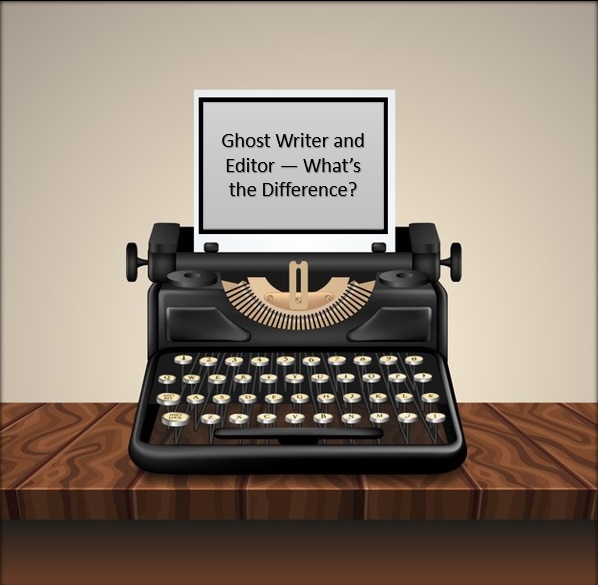
Writing
There is a stark difference between ghostwriter and editor. The main difference can be understood as: a ghostwriter is a person who writes. Whereas an editor is a person who makes sure the writing is done to perfection. But is this all the difference between ghostwriter and editor? The simple and short answer is no.
Those who are getting their book ghostwritten for the first time can get confused. On top of it, there are multiple types of editors. So how do we differentiate between them? It is a little complicated. So it’s not easy to know which one do we need at the moment?
Before knowing the difference between ghostwriter and editor, let’s look at a ghostwriter and editor.
Who is a Ghostwriter?
A ghostwriter is a person who articulates for another person on behalf of money. This ghostwriter offers their services to (a)those who do not like writing, (b) those who cannot write well (c) those who do not have time. Therefore, hiring a ghostwriter’s services means that you can have your work published in less time.
Besides, a ghostwriter is a person who has writing expertise. Regardless of a writing genre, if they are a professional and creative writer, they can help you communicate thoughts with many people. Just as in any writing genre, a ghostwriter has a specific niche.
There are multiple genres in which you can find a ghostwriter —fiction, Non-Fiction, Academic, Drama, and Poetry. Likewise, these three categories are further divided into subcategories.
Fiction:
- Romance.
- Fantasy
- Science fiction
- Realistic fiction
- Historical fiction
- Fanfiction
- Classics
- Fairy-tale
- Mythology
- Horror
- Drama
- Crime
- Suspense/thriller
- Satire
- Anthology
Non-Fiction
- Biography/autobiography
- Self-help books
- Speech
- Essays
- Business books
- Memoirs
- White papers
- Manuals
- Guides
- Periodicals
- Articles/blogs
- Magazine
- Scripts
- Encyclopedia
- Dictionary/ thesaurus
- Reference books
- Emails
Academic:
- Research
- Thesis
- Informative
- Dissertation
- Proposal
- Textbooks
- Reports
Drama:
- Comedy
- Tragic-comedy
- Tragedy
- Didactic
Poetry:
- Songs/lyrics/music
- Elegy
- Sonnet
- Free verse/black verse
- Rhyming poems
- Haiku
- Acrostic or pictorial poems
The point of mentioning these categories is that you must know which ghostwriter you are hiring and, more importantly, its purpose. If you hire a non-fiction writer for writing a murder mystery fiction novel, there is a chance that it will not create an engaging book. Every field requires specific skills that are relevant to that particular field. Your goal should be to hire a perfect resource for your book. It entirely depends on you which subject you are focusing on. They will help you from ideation of your content(book) to make its first outline. They ensure that your thoughts are conveyed effectively in your writings.
Who is the editor?
An editor is a critical person right after a writer, in this case, a ghostwriter. When both the ghostwriter and editor work on the same project, the chances are high that the project will yield positive results. An editor’s job is to ensure the accuracy, correctness, efficiency, and effectiveness of the text. These are people who are sensitive to another person’s work.
Editors are responsible for polishing and refining any type of work irrespective of the writing niche. Likewise, they are responsible for fact-checking, grammar accuracy, tenses as well as voice consistency, cohesion and connectivity, writing flow, and punctuation. They read your manuscript times and again to make it error-free.
Therefore, they can be called the helpers of writers, who help via critical eyes to details skills. They handle the write-ups with such care that they make them devoid of mistakes and errors. Their job is to refine the text to a high level of professionalism. Different types of editors can help you edit your work depending on the writing stage you are at. They can also be your critique partner or a beta reader. Making the right choice in hiring an editor is important. For the efficiency of the book writing, there should be a strong pact between ghostwriter and editor.
Development Editing
A development editing is editing of your text on a macro level. A developmental editor will work to refine the concept of your content. Whether it is a book, a memo, or a novel, every book needs to be checked for its concept accuracy and fact-checking. These editors make changes for the betterment of the plot, characters’ motivations, and attitudes. Likewise, it ensures that your story has the perfect ending, and it does not create any confusion for the readers.
Line Editors:
Line Editors are a type of editors who analyze, correct or edit the text line by line. They improve the text on the level of line, phrases, and paragraphs. They read the manuscript to make the necessary changes in the text on a micro-level. Their focus is entirely on the language, unlike the developmental editors who focus on conceptual editing. They ensure that your language is clear, fluid, and interesting. Therefore, their focus of editing is related to redundancy, dialogue correction, removing confusions, words, and phrases.
Copy-editing
Copy-editing is the editing of the copy on a micro-level. They improve the syntax and grammar mistakes. They edit the writing for the inaccuracy and inconsistency within the text. Although their work is similar to line editors, they are focused on making the text follow the rules, standards, and the style guide of the particular genre in which the text is written. In short, copy-editors are responsible for the effectiveness of the writing style.
Proofreading
When the macro and micro-level of editing is completed comes the stage of proofreading. This type of editing is done after the finalization of the manuscript, including the design. Proofreading helps correct the looming inconsistency in the design like breakage in line, extra gaps within the words, sneaky grammar mistakes, and graphical representation in the book. Proofreaders have sharp eyes to understand and analyze all the mistakes from the readers’ perspective.
Also, proofreaders are the professional people who will monitor and gauge the success of your writings. Keeping the timeline of your work, they will deliver the work on time. It is essential to do their background check and see their history because you would never want to hire someone who is all talk and no action.
Difference between ghostwriter and editor:
The difference between ghostwriter and editor is of a Jewelry Crafter and the Polisher:
The first and the foremost difference between ghostwriter and editor is that one performs the actual writing and fills up your empty pages. The latter ensures that all of your reflection is accurate, clear, and thoughtful. You can take the example of a jeweler and its jewelry polisher.
A ghostwriter is equivalent to a jewelry maker. The ghostwriter will extract the story, just as a jeweler will extract the stones or the diamond to create an appealing item. Like the jeweler, a writer does the actual hard work of crafting a literary piece that engages and impresses its spectators.
The writer does the designing of the words to create an effective story. At the same time, editing is equivalent to jewel polishing that requires precision, care, and delicate handling of the item. Your editor will ensure that your work remains effective and clear, keeping your work shining among the clutter of words.
Your editor will ensure that your work does not have any redundancy; there are no grammar, spelling, syntax, or pragmatic errors. You may have an idea of how your ghostwriter is the designer of the words, while an editor is a technician.
Automotive Analogy
If you are not into jeweler analogy, then understand the difference between ghostwriter and editor through the automotive analogy.
The difference between ghostwriter and editor is of an Engineer and the Mechanic:
Just as an automotive engineer works on creating a blueprint, designing, and work on the vehicle in a broader sense, a writer does the same thing. Your ghostwriter works on your idea to formulate them in the form of a book. A ghostwriter is good with words, so with creativity. He or she works hard to assemble all the research, data, and creative ideas to produce the work effectively. Regardless of the number of pages, if their thoughts deserve to be shared with the world, ghostwriters would write them down.
Your ghostwriter may not care if their opinions are structured properly or if they have sidetracked from their initial thought; they keep writing until it starts to make sense in the end. They leave the editing part for the end.
In contrast to the engineer whose job is to design and build, a mechanic’s approach ensures that everything works fine in the automobile. Your editor’s job is to ‘fix’ any issue that comes during the writing phase. They run a diagnostic test to see how every part of your story is working, from editing a word and line to moving or deleting sections of pages. They are employed technicians to help produce effective work. Editors help the writers in the placement of ideas and thoughts. They ensure the impact of the story.
Difference Between Ghostwriter and Editor
The difference between ghostwriter and editor is of a Mother and the Midwife:
For ghostwriters or writers in general, words are babies. You can understand the difference between ghostwriter and editor through this mother and midwife analogy.
| Writing Dimension | Insights and Advice | Career Impact |
|---|---|---|
| Understanding Your Niche | Focus on writing about subjects you are passionate about, like specific genres or topics. | Builds expertise and attracts a dedicated audience in that niche. |
| The Art of Listening | Listen to clients and audiences to understand their needs and preferences. | Enhances writing relevance and audience engagement. |
| Idea Generation | Explore different sources for new ideas, including personal interests and market trends. | Keeps content fresh and appealing, avoiding creative stagnation. |
| Freelance Writing Foundations | Start with lower rates and build a portfolio, focusing on gaining experience. | Establishes credibility and paves the way for higher-paying opportunities. |
| Genre Specialization | Choose a specific genre to specialize in, based on knowledge and interest. | Positions you as an expert in a particular area, opening up specialized writing opportunities. |
| Diverse Writing Styles | Learn various writing styles to adapt to different genres and client needs. | Increases marketability and flexibility as a writer. |
| Building Professionalism | Develop a professional presence with a website, portfolio, and clear communication. | Enhances credibility and attracts serious clients and projects. |
Just like a mother, ghostwriters incubate their words, nurture them, and develop the whole story. They take time to give life to their words. They put pour down their emotions, sentiments, time, and feelings into their thoughts and ideas. Ghostwriters may be the sole creator of artistic write-up irrespective of their writing genre.
In contrast, like a midwife, an editor brings those words into the world carefully. They ensure that the life of creativity stays alive and safe. They are the ones who support the ghostwriters during the critical process of publishing their work. Editors undertake the role of providing emotional support as well as technical support to the writer.








